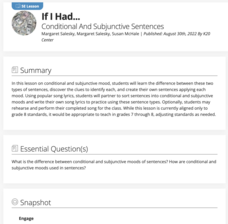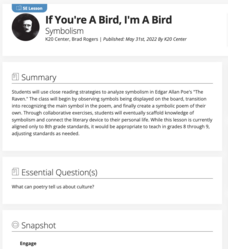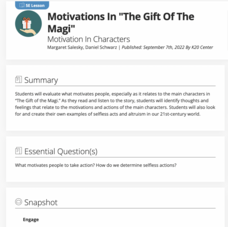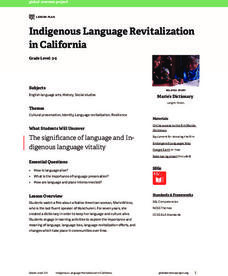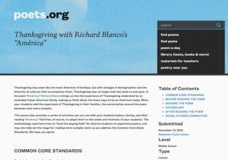K20 LEARN
Multimodal Narrative Writing: Thumbprint Autobiography
Thumbprints, like people, are unique. Middle schoolers watch videos that explain how fingerprints are created and why they are unique. Learners then respond to guiding questions about themselves and use these details to create their...
K20 LEARN
If I Had... Conditional and Subjunctive Sentences
Lines from popular songs are used to teach middle schoolers about conditional and subjunctive moods. Groups engage in a card sort activity to identify conditional and subjective sentences and then partners draft sentences of each type....
K20 LEARN
If You Give a Mouse a Cookie: Conditional Statements
If, then, Else is not only a basic programming language command, it is also the basis for conditional statements used in writing. Middle schoolers try to craft conditional statements with a card sort activity and then collaborate on a...
K20 LEARN
Sweet and Savory Writing: Descriptive Writing
The engagement is in the details. Young scholars learn the benefit of weaving descriptive and sensory details into the fabric of their writing through the activities in this lesson. As their hands explore items concealed in bags, a...
K20 LEARN
Is Pizza Epic? Word Choice
Remember when everything was Fantastic! Fabulous! Awesome! Iconic! A series of activities encourages young writers to move beyond these overused descriptors and instead choose a more precise language.
K20 LEARN
Nose Like a Cherry: Understanding Similes and Metaphors
Clement Moore's "Twas the Night Before Christmas" models the power of descriptive language for middle schoolers. They identify the similes and metaphors in the tale and consider what these descriptions add to the story's emotional...
K20 LEARN
No Imitations, Please! Avoiding Plagiarism
With all the stuff available online, good essays are just a click away. But talk about tracking! Writers beware! New tech can now identify plagiarism, and the consequences of presenting someone else's work as your own are severe. Here's...
K20 LEARN
More than Meets the Eye: Direct and Indirect Characterization
Willy Wonka takes center stage in a lesson about direct and indirect characterization. Scholars read a passage from the story about Wonka's Grand Entrance and watch a film clip of the same, noting examples of direct and indirect...
K20 LEARN
Introduction to Expository Writing
Move beyond the five-paragraph essay with a lesson introducing young writers to various forms of expository writing. Class members examine description, cause and effect, problem solution, sequence, and comparison forms. They create an...
K20 LEARN
If You're a Bird, I'm a Bird: Symbolism
Would a bluebird be as scary as a vulture? Edgar Allan Poe's "The Raven" is the central text in a lesson about symbolism. After a close reading of the poem, learners consider what the raven might represent to the narrator. They then...
K20 LEARN
Motivations In "The Gift Of The Magi": Motivation In Characters
O. Henry's short story, "The Give of the Magi," launches a study of what motivates people to act as they do. Class members identify what they believe are the motivations of the characters in O. Henry's tale and then craft a one-page...
Global Oneness Project
Indigenous Language Revitalization in California
A film showcases a Native American woman and her hard work to create a dictionary detailing her tribe's language. While viewing, scholars reflect upon and discuss the importance of language and sustaining cultural identity.
Global Oneness Project
The Importance of Indigenous Language Revitalization
Middle schoolers consider languages as representations of cultures and the importance of preserving various languages, especially the rapidly disappearing languages of indigenous peoples, in a lesson that tells the story of Marie Wilcox...
Curated OER
Sioux Chef Sean Sherman: A Rebirth of Native American Cuisine
Many families have special dishes they serve during holiday celebrations and get-togethers. Many of these recipes have been handed down from generation to generation and often come with stories. Introduce your middle schoolers to the...
Curated OER
Impact of Native Americans
Scholars discover the contributions Native Americans have given the world. Pupils examine materials and discuss their importance, including American Sign Language. A worksheet carefully organizes examples; groups jigsaw a reading passage...
Curated OER
Honoring Warrior Spirit: The National Native American Veterans Memorial
Thoughtful discussion highlights Native American veterans and the Native American Veterans Memorial. Scholars explore what it means to be a warrior—the Warrior Tradition—and the process of creating the memorial that honors Native...
Curated OER
The Cultural Significance of Naming
The Navajo would disagree with Shakespeare that the naming of things is irrelevant. Navajo people have to earn their names. Middle schoolers learn about the cultural significance of Navajo names in a lesson that uses a video and reading...
Curated OER
Te Ata Fisher: The Award-Winning Chickasaw Storyteller
Storytelling is a time-honored way to keep a culture alive. Introduce middle schoolers to Te Ata Fisher, the famous Chickasaw storyteller who shared her stories, songs, and dances across the United States and Europe. Young historians...
Curated OER
What Exactly Is Food Sovereignty?
Something is happening here, and what it is is becoming increasingly clear. Middle schoolers investigate the connections between processed foods and health issues and the movement back, especially by Native Americans, to other food choices.
Curated OER
Celebrate Joy Harjo: The First Native American Poet Laureate
Introduce middle schoolers to Poet Laureate Joy Harjo with a lesson that not only explains the role and duties of the Poet Laureate but also contains a video in which Harjo explains what she sees as her responsibility as a Native...
Curated OER
Indigenous Peoples’ Day
A lesson looks closely at the history and importance of Indigenous Peoples' Day. Scholars view an engaging video, then create a book that celebrates Native Americans. Thoughtful discussion and research highlight their contributions.
Curated OER
Food Traditions: Making Cherokee Bean Bread
Imagine being forced out of your home and walking over 1,000 miles with only the things you could carry. How would you survive? What would you eat? After reading about the Trail of Tears and Cherokee resilience, middle schoolers are...
Academy of American Poets
Thanksgiving with Richard Blanco's "América"
Traditions, like the times, are a-changin'. Middle schoolers conduct a close reading of Richard Blanco's poem "América" and consider how Blanco's family approached his suggestions for adopting a new approach to their Thanksgiving meal.
Smithsonian Institution
Harvest Ceremony: Beyond the Thanksgiving Myth
There is a grain of truth in myths. Young historians investigate the truths surrounding the popular beliefs about the First Thanksgiving in Plymouth, Massachusetts. After reading the information in a study guide, they use what they...



